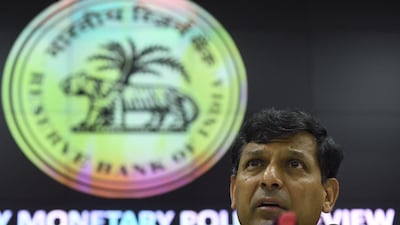MUMBAI // A larger-than-expected rate cut delivered by India’s central bank on Tuesday will have mixed blessings for Indian expats in the UAE, according to experts.
Interest rates on savings and home loans in India are set to fall after Raghuram Rajan, the Reserve Bank of India governor (RBI), cut rates to the lowest level in more than four years, reducing the benchmark repo rate to 6.75 per cent from 7.25 per cent. Most analysts expected a cut of only 25 basis point.
The cut, the fourth this year, was welcomed by industry in India and is widely expected to help boost the economy after growth slowed in the second quarter of the year to 7 per cent compared to 7.5 per cent the first quarter. Pressure had been mounting on the RBI to cut rates as inflation levels have eased.
Stocks rose on Tuesday, with the benchmark BSE Sensex closing up 0.63 per cent at 25,778.66.
Banks in India are expected to lower interest rates for consumers following the move.
“This will mean that fixed deposits may not be as lucrative for Indian expats, so unless they really need that money in the country, they should look around because India also has a foreign exchange risk,” said Gaurav Mashruwala, a financial planner based in Mumbai.
A number of NRIs (non-resident Indians) in recent years have borrowed money in the UAE to send to India to put in fixed deposit accounts and take advantage of the interest rate differential. But if the rupee weakens further, and given the fact that interest rates on these savings are expected to fall, NRIs could end up losing money when they have to return those funds to the UAE, Mr Mashruwala explained.
Some NRIs have been burnt by this, he added.
The rupee on Tuesday was trading at about 66 against the US dollar compared to about 61.5 a year ago. The UAE dirham is pegged to the dollar, so the rupees’s movements against the dollar are reflected in the exchange rate with the dirham.
“Even though the interest rates have come down, a section of people still do park their cash in fixed deposits,” said Adeeb Ahamed, the chief executive of Lulu International Exchange. “There are higher-yielding investments in India, like real estate, which many NRIs are looking into and they are keen on buying homes across key cities, so that they get good returns later.”
The main advantage of the interest rate cut will be for NRIs planning to borrow money in India, for example to buy property. It is not clear whether banks would pass on the full cut and reduce loans by as much as 50 basis points, however.
“Definitely there will be an advantage for those NRIs who have housing loans in India,” said Promoth Manghat, the chief executive of UAE Exchange. “That will help with increasing their disposable income because their servicing cost is going to come down.”
He said as fixed deposit rates come down “there would definitely be a change in the pattern of investments”.
Mr Ahamed said that many NRIs had taken advantage of the sharp fall in the rupee a few weeks ago to remit money home after the devaluation of the Chinese yuan led to a slump in Asian currencies.
“Remittances have been on a downward trend for the past four to five days in spite of a strong US dollar, and showed a slight spike only a few days prior to Eid,” he added.
business@thenational.ae
Follow The National's Business section on Twitter

